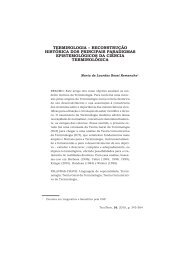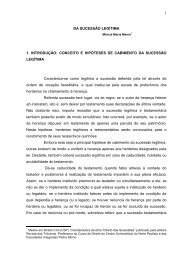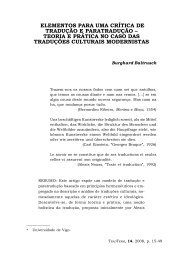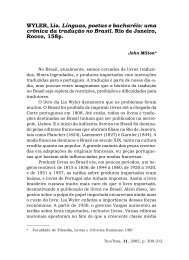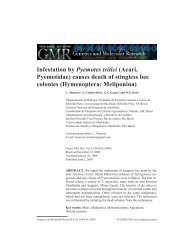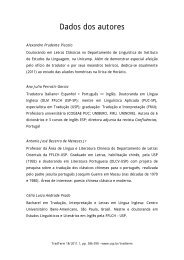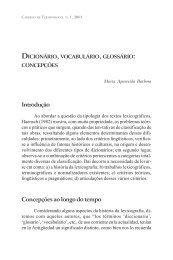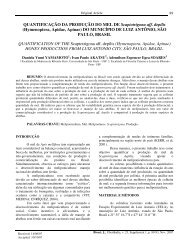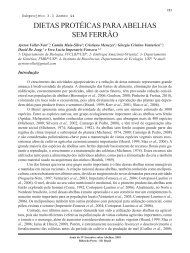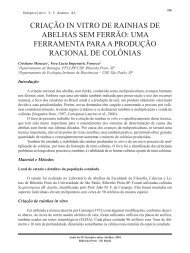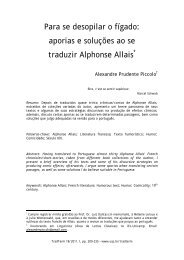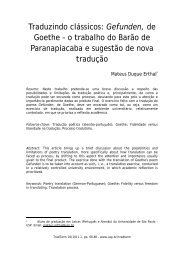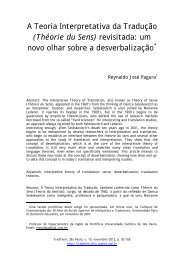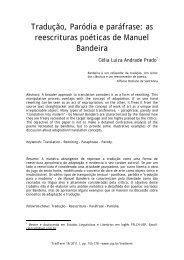Bees as pollinators in Brazil - USP
Bees as pollinators in Brazil - USP
Bees as pollinators in Brazil - USP
Create successful ePaper yourself
Turn your PDF publications into a flip-book with our unique Google optimized e-Paper software.
72<br />
4.Initiate a scientific journal on poll<strong>in</strong>ator<br />
biology <strong>in</strong> <strong>Brazil</strong>. <strong>Brazil</strong> h<strong>as</strong> many bee<br />
researchers, however much of the <strong>in</strong>formation<br />
is not readily available. A scientific<br />
journal will help remedy this problem and<br />
will help direct students and professors to<br />
study poll<strong>in</strong>ation problems. This journal<br />
could be produced onl<strong>in</strong>e at relatively low<br />
cost, and could help consolidate bee<br />
research <strong>in</strong> <strong>Brazil</strong>.<br />
5.Develop a manual on research techniques for<br />
poll<strong>in</strong>ator studies, especially to determ<strong>in</strong>e the<br />
value of <strong>poll<strong>in</strong>ators</strong> for crop production.<br />
Rational Program of Poll<strong>in</strong>ation<br />
1.Determ<strong>in</strong>e how well crops are poll<strong>in</strong>ated<br />
currently and <strong>in</strong>vestigate the production<br />
potential if there were full, adequate<br />
poll<strong>in</strong>ation. Some crops are already<br />
well poll<strong>in</strong>ated, and additional <strong>poll<strong>in</strong>ators</strong><br />
do not <strong>in</strong>cre<strong>as</strong>e production. In other crops<br />
and regions, there are so few natural <strong>poll<strong>in</strong>ators</strong><br />
that supplemental poll<strong>in</strong>ation can<br />
make the difference between uneconomical<br />
production and profit.<br />
2.Estimate economic viability of poll<strong>in</strong>ation<br />
program. The producer needs to have<br />
an idea about whether it will be economically<br />
viable to use poll<strong>in</strong>ation for his crop, consider<strong>in</strong>g<br />
the costs <strong>in</strong>volved with personnel,<br />
transport, and rent<strong>in</strong>g bee colonies, compared<br />
to the <strong>in</strong>cre<strong>as</strong>es <strong>in</strong> production.<br />
3.Identification of the requirements of the<br />
crop and determ<strong>in</strong>ation of the poll<strong>in</strong>ation<br />
needs. Each vegetal species h<strong>as</strong> its<br />
own specific poll<strong>in</strong>ation needs and appropriate<br />
poll<strong>in</strong>ation techniques are needed to fulfill<br />
these needs.<br />
4.Determ<strong>in</strong>e the poll<strong>in</strong>ation strategy that<br />
should be used. There is a need to determ<strong>in</strong>e<br />
the number of colonies per hectare,<br />
the arrangement and temporal placement<br />
of the colonies and <strong>in</strong>tegration with other<br />
cultural practices.<br />
5.Design and <strong>in</strong>stall apiaries and <strong>in</strong>fr<strong>as</strong>tructure<br />
necessary for poll<strong>in</strong>ation.<br />
Determ<strong>in</strong>e the number of apiaries and<br />
colonies that will be needed at appropriate<br />
times to give support to the poll<strong>in</strong>ation<br />
activities.<br />
6.Tra<strong>in</strong><strong>in</strong>g of personnel responsible for<br />
ma<strong>in</strong> ta<strong>in</strong><strong>in</strong>g the colonies <strong>in</strong> conditions<br />
ade quate for poll<strong>in</strong>ation. Prepar<strong>in</strong>g colo -<br />
nies for poll<strong>in</strong>ation requires specific management<br />
so that they will be at an adequate<br />
stage of development and with sufficiently<br />
large populations to adequately<br />
poll<strong>in</strong>ate the crop.<br />
7.Tra<strong>in</strong><strong>in</strong>g of personnel to collect poll<strong>in</strong>ation<br />
data <strong>in</strong> the field or hire such help. The<br />
results of poll<strong>in</strong>ation should be constantly<br />
monitored.<br />
F<strong>in</strong>al recommendations<br />
Consider<strong>in</strong>g what are the conservation me<strong>as</strong>ures<br />
necessary to keep a stable population of<br />
Africanized bees <strong>in</strong> the cropp<strong>in</strong>g are<strong>as</strong>:<br />
1.<strong>in</strong>centives, such <strong>as</strong> tax exemptions for beekeepers<br />
and for growers for poll<strong>in</strong>ation of<br />
crops <strong>in</strong> <strong>Brazil</strong>;<br />
2.PDF-B should make a policy of recogniz<strong>in</strong>g<br />
the need for Africanized bees for poll<strong>in</strong>ation;<br />
3.conduct c<strong>as</strong>e studies to show the importance<br />
of wild <strong>poll<strong>in</strong>ators</strong> <strong>in</strong> respective habitats;<br />
4.stop <strong>in</strong>discrim<strong>in</strong>ate logg<strong>in</strong>g and commercial<br />
fell<strong>in</strong>g of trees by enact<strong>in</strong>g laws;<br />
5.promote and encourage re-conversion of a<br />
certa<strong>in</strong> percentage of <strong>in</strong>tensively cultivated<br />
are<strong>as</strong> to provide rescue space for the multiplication<br />
of wild honey bee colonies by<br />
provid<strong>in</strong>g <strong>in</strong>centives (tax exemptions, subsidies<br />
etc.);



